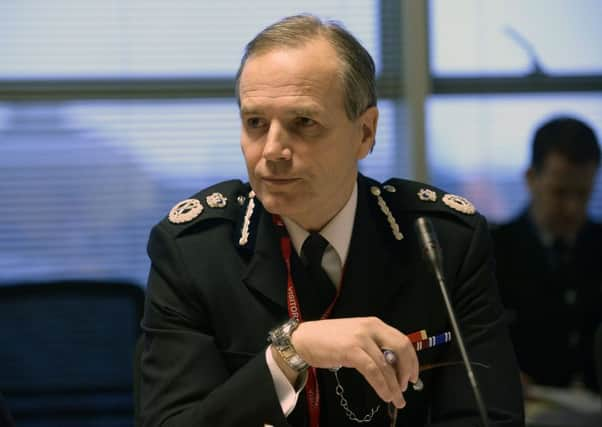Dani Garavelli: Police chief’s apology too late


Sir Stephen House is not known for openness, self-reflection or admissions of inadequacy. Indeed, his time at the helm of Police Scotland has been characterised by a single-mindedness bordering on arrogance and a refusal to brook any criticism; whether under fire over the closure of control rooms, stop and search or armed officers on routine patrol, he seldom betrays a flicker of self-doubt or feels the need to justify himself or his policies to the public.
Last week, though, Police Scotland found itself at the centre of a scandal so shocking not even House could brazen it out. On Wednesday, it was revealed that missing couple John Yuill and Lamara Bell had lain in the wreckage of their car for three days after police failed to respond to a report of the accident they had been involved in. When they were finally discovered, Yuill was dead, but Bell was critically ill, having suffered kidney damage from dehydration after being left unattended, she died in hospital this morning.
Advertisement
Hide AdAdvertisement
Hide AdLater, it emerged a member of the public had called the non-emergency 101 number after spotting their Renault Clio down an embankment near the Bannockburn slipway of the M9 at around 11:30am on Sunday – several hours after the couple left the south shore of Loch Earn, where they had spent the weekend camping – but that the call not been followed up.
With relatives and the public outraged, politicians calling for answers and the story climbing up the national and international news agenda, House finally bowed to the inevitable.
On Friday, he apologised and conceded the force had failed both families. “Our duty is to keep people safe and we’ve not done that effectively on this occasion, with tragic consequences,” he said. The incident has been referred to the Police Investigations and Review Commissioner (PIRC), which will focus on why the report was not fed into the police systems (though some believe a wider independent review might be more appropriate).
Though it took him fully 48 hours to make it, there was nothing insincere about House’s statement. He sounded genuinely chastened as he talked about the scale of the error and its impact. How could he do anything but sympathise with Bell, who spent so long beside her dead boyfriend as her own health ebbed away?
This upfront attitude was so different to anything we had witnessed before; as I watched House face the music, I couldn’t help but feel a bit more candour and concession to public relations over the past two years might have saved his career and enhanced Police Scotland’s reputation.
Compare it to the approach taken over the death of Sheku Bayoh in custody in Kirkcaldy in May. Of course, we do not know if any of the officers involved in detaining him was culpable in any way, but the force’s response has been one of obfuscation, with the family reportedly being given conflicting stories and the officers appearing less than eager to co-operate with the PIRC. House appears to have been unable or unwilling to take control or provide any clarification.
In this instance, an apology would have been inappropriate but there has been no expression of regret for a man’s untimely death or of sympathy for his family.
Labour MSP and former head of the Scottish Crime and Drug Enforcement Agency Graeme Pearson criticised the force’s handling of the case, saying a high-ranking official should have been tasked with gathering and disseminating clear information.
Advertisement
Hide AdAdvertisement
Hide AdThis same defensiveness and disregard for public opinion has been on display in connection with almost every policy, from the raids on Edinburgh saunas to the crackdown on Glasgow’s Arches club. There has been no obvious embarrassment over the excessive use of stop and search, nor any obvious move away from a targets-driven approach to minor offences. Personal experience suggests motorists are still being stopped on questionable pretexts such as not matching the description of the registered driver or a “faulty” tail-lamp that turns out to be working.
It is terrible that it has taken a scandal of this proportion to make Police Scotland wake up to its own failings. Though this may turn out to be a one-off response to a specific set of circumstances, one can only hope the acknowledgement of the force’s fallibility will usher in a new era.
At the very least it ought to provoke a reassessment of the move to close five control rooms to save millions of pounds – a policy carried out without public consultation and which Scottish Lib Dem leader Willie Rennie says may have had “a detrimental impact on the quality of service”.
Earlier this year, Rennie told Holyrood the control room at Bilston Glen in Midlothian was struggling to cope, with 101 calls taking up to 40 minutes to answer and 1,000 lost in the space of a day, but his warnings appear to have gone unheeded. Bilston Glen now fields 20,000 101 calls and 3,200 999 calls a week
Any epiphany caused by last week’s tragedy comes too late for House, who has already indicated he will leave when his contract ends next year. And last week, Vic Emery announced he will stand down as chair of the Scottish Police Authority in two months’ time; but the clear-out opens up the possibility of a fresh start.
In the short term, the PIRC inquiry must expose whatever flaws in the 101 emergency call system caused this devastating oversight so they can be fixed; but in the long term, what we really need is greater transparency and a return to policing by consent.